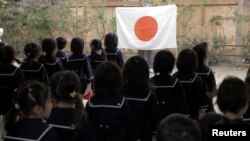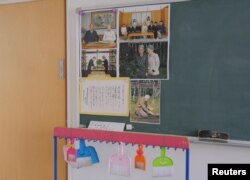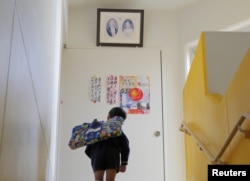At first glance, the Tsukamoto kindergarten looks like any other school in Japan, but its unique curriculum is reminiscent of pre-war Japan.
The private school, which has been visited by Akie Abe, wife of Prime Minister Shinzo Abe, aims to instill in its 3- to 5-year-old students a sense of patriotism with a curriculum focused on Japanese traditions and culture.
Its mornings start with uniformed children singing the national anthem in front of the country's flag and reciting in stilted Japanese the pre-war Imperial Rescript on Education, containing commandments set out in 1890 to nurture "ideal" citizens under the Emperor Meiji. These embody Confucian virtues and demanded devotion to the emperor and sacrifice for the country.
"Be filial to your parents, affectionate to your brothers and sisters," they chant. "Should emergencies arise, offer yourselves courageously to the state."
Fueling nationalism
After World War II, occupying U.S. forces abolished the rescript, which many saw as a source of the obedience and moral certitude that helped fuel Japanese militarism.
In 1947, the postwar government passed the Fundamental Law on Education to bolster the liberal and democratic values of the postwar pacifist constitution.
Tsukamoto kindergarten, in Osaka, introduced the rescript 15 years ago, although school officials say it is not intended to fuel nationalism.
"What we're aiming to foster in education is patriotism or 'Japanese-ism,' expanding Japan's spirit all over the world, not so-called nationalism. These are totally different," said Yasunori Kagoike, principal of the kindergarten.
Kagoike heads the Osaka branch of Nippon Kaigi, or the Japan Conference, a nationalist lobby group with close ties to Abe and his Cabinet and for which education reform is a key tenet.
Protecting nation
Cultural activities at the school, where the walls are lined with images of the imperial family to which students bow throughout the day, include learning traditional Japanese musical instruments, martial arts and board games. Students also take trips to military bases.
Kagoike said he hoped other schools would adopt their curriculum so children are prepared to protect their nation against potential threats from other countries.
"If an imperialist nation is trying to harm Japan, we need to fight against it. For that, revising Article 9 of Japan's Constitution is indeed necessary and should be carried out as soon as possible," he said.
Article 9 of the U.S.-drafted constitution renounces war and, if read literally, bans the maintenance of armed forces, although Japan's military, called the Self-Defense Forces, has over 200,000 personnel and is equipped with high-tech weapons.
Revising the constitution is one of the key policy targets of Abe's Liberal Democratic Party. His government has already stretched its limits to give the military a bigger role.
Necessity of fighting
Using an analogy of stopping a burglar getting into the house, teacher Chinami Kagoike — the principal's daughter — said she teaches students it is necessary to fight against such threats to protect themselves and their families.
"Strengthening Japan would be subject to severe criticism from various countries," she said. "But instead of pulling away from this, I teach children that the Japanese government has clearly demonstrated its will, so you also need to break silence and go forward and say you want to protect your family."
The kindergarten plans to open a primary school next year, and Akie Abe will be the honorary principal, according to school brochures.
Michael Cucek, an adjunct professor at Temple University's Tokyo campus, said Abe's wife is often seen as a proxy for the prime minister, who during his first, 2006-07 term oversaw the revision of the education law to put patriotism back in school curricula.







